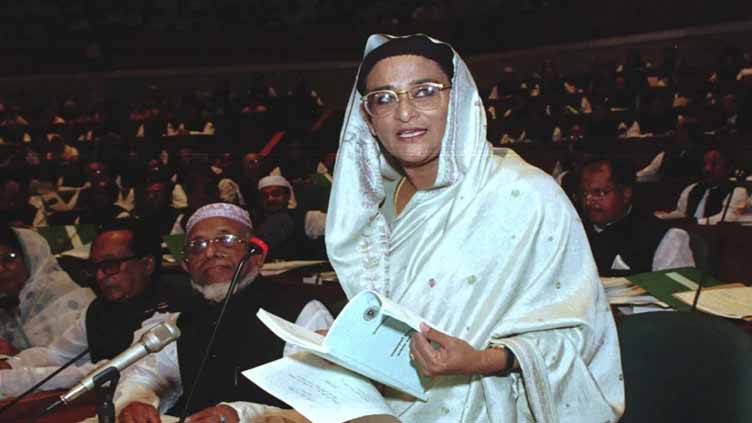Sheikh Hasina came back from tragedy to lead Bangladesh — until protests forced her to flee

World
Hasina first became prime minister in 1996, and then returned in 2008 to win the office
DHAKA, Bangaladesh (AP) — Sheikh Hasina, the longest-serving prime minister in Bangladesh’s history, resigned and fled the country on Monday, bringing a tumultuous end to her 15-year rule as an extraordinary wave of protest succeeded in toppling her government.
Her ouster came after weeks of relentless protests and clashes with security forces that have killed nearly 300 people since mid-July, according to local media reports. What began as peaceful demonstrations by students frustrated with a quota system for government jobs unexpectedly grew into a major uprising against Hasina and her ruling Awami League party.
The recent upheaval was the largest and last crisis for the 76-year-old leader, the world’s longest-serving female head of government, who won a fourth consecutive term in January in an election boycotted by the main opposition amid concerns that the polls were not free or fair.
Hasina first became prime minister in 1996, and then returned in 2008 to win the office she held until Monday.
Analysts who have tracked her rise say her political life was driven by tragedy. On Aug. 15, 1975, her father and the first leader of independent Bangladesh, Sheikh Mujib Rahman, was assassinated in a military coup.
That fateful night, while 28-year-old Hasina was in Germany with her younger sister, a group of army officers burst into the family’s Dhaka home and killed her parents, three other siblings and the household staff — 18 people in all.
Some say the brutal act pushed her to consolidate unprecedented power. It was also what motivated her throughout her political career, analysts say.
“Hasina has one very powerful quality as a politician — and that is to weaponize trauma,” Avinash Paliwal, a former university lecturer who specialized in South Asian strategic affairs, said in January ahead of the general election.
To Hasina, her father was the founder of independent Bangladesh after its forces, aided by India, defeated Pakistan in 1971.
After the assassination, Hasina lived for years in exile in India, then made her way back to Bangladesh and took over the Awami League. But the country’s military rulers had her in and out of house detention all through the 1980s until, after a general election in 1996, she became prime minister for the first time.
What followed was a decadeslong power struggle between Hasina and former Prime Minister Khaleda Zia, the chief of the main opposition Bangladesh Nationalist Party, who’s now ailing and under house arrest.
The two women ran the country alternatively for years in a bitter rivalry that polarized Bangladesh politics. Hasina has often accused the BNP of courting hard-line extremists that her party, which calls itself moderate and secular, had worked to stamp out, while Zia’s BNP claims the Awami League is using oppressive tactics to stay in power.
The two traded blame as the recent protests turned violent. The BNP, which backed the student protesters, repeated calls for Hasina to step down while she accused them of stoking the violence.
She said the protests had been overtaken by the BNP and another opposition party that her government banned recently.
After Hasina lost the general election in 2001, she became the leader of the opposition. Political violence, unrest and military interventions marked the years until she was reelected.
Back in power, she fixed her sights on the economy and built infrastructure previously unseen in Bangladesh: a strong electricity grid that reaches far-flung villages and big-ticket projects such as highways, rail lines and ports. The country’s garment industry became one of the world’s most competitive.
The development gains sparked other advances. Girls were educated on par with boys, and an increasing swell of women joined the workforce. Those close to her described Hasina as hands-on and passionate about uplifting women and poor people.
On the international stage, Hasina cultivated ties with powerful countries including both India and China. But the United States and other Western nations expressed concerns over violations of human rights and press freedoms, straining relations. In January, after she won a fourth consecutive term, the U.S. and


